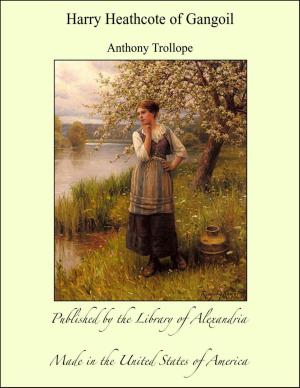Isabel Clarendon (Complete)
Nonfiction, Religion & Spirituality, New Age, History, Fiction & Literature| Author: | George Gissing | ISBN: | 9781465614865 |
| Publisher: | Library of Alexandria | Publication: | March 8, 2015 |
| Imprint: | Language: | English |
| Author: | George Gissing |
| ISBN: | 9781465614865 |
| Publisher: | Library of Alexandria |
| Publication: | March 8, 2015 |
| Imprint: | |
| Language: | English |
From Salcot East to Winstoke there are two roads, known respectively as the old and the new. The latter was made about the middle of the present century; the old road is immemorial. By the modern highway the distance between the two parishes is rather less than five miles; pursue the other, and you fetch a compass of well-nigh ten, taking into account all the inexplicable windings and angularities between the “White Hart Inn” at Salcot, where the roads disdainfully part company, to Winstoke Rectory, where they unite and form the village street. It says much for ancestral leisureliness in that north-west corner of ———shire, that the old way ever established itself, or, being established, was used to so recent a date; on the other hand, the construction of the new thoroughfare looks remarkably like a practical joke, perpetrated at their own expense by the good people of the country side, seeing that this activity displayed itself just when it was least called for. Formerly, there was a silk manufactory at Salcot East, and direct communication with the neighbouring parish would have been a convenience; only when the industry in question had fallen into complete decay, and when it could not matter to any one whether it took one hour or two to reach Win-stoke (where not even a market was held), did the inhabitants tax themselves for the great undertaking. As regards picturesqueness, needless to say that the old road has enormously the advantage. A pedestrian with time on his hands and walking for walking’s sake, could not hesitate between the hard white turnpike, running on into level distance between dusty hedgerows, and that charming glimpse of elm-shadowed lane, grass creeping from the densely verdurous bank on either side to the deep moistened ruts, and, twenty yards away, a sudden turn round a fantastic oak, all beyond a delightful uncertainty. Such a pedestrian was Bernard Kingcote, a man neither too old nor too busy to be rambling aimlessly on this Midsummer Day; over his shoulders a small knapsack, with a waterproof strapped upon it, in his hand a stick he had cut from an oak-tree. Since eleven in the morning the sun had shone as in England it shines but rarely—a steady force of fire which drew the perspiration from every pore of one standing unshaded.
From Salcot East to Winstoke there are two roads, known respectively as the old and the new. The latter was made about the middle of the present century; the old road is immemorial. By the modern highway the distance between the two parishes is rather less than five miles; pursue the other, and you fetch a compass of well-nigh ten, taking into account all the inexplicable windings and angularities between the “White Hart Inn” at Salcot, where the roads disdainfully part company, to Winstoke Rectory, where they unite and form the village street. It says much for ancestral leisureliness in that north-west corner of ———shire, that the old way ever established itself, or, being established, was used to so recent a date; on the other hand, the construction of the new thoroughfare looks remarkably like a practical joke, perpetrated at their own expense by the good people of the country side, seeing that this activity displayed itself just when it was least called for. Formerly, there was a silk manufactory at Salcot East, and direct communication with the neighbouring parish would have been a convenience; only when the industry in question had fallen into complete decay, and when it could not matter to any one whether it took one hour or two to reach Win-stoke (where not even a market was held), did the inhabitants tax themselves for the great undertaking. As regards picturesqueness, needless to say that the old road has enormously the advantage. A pedestrian with time on his hands and walking for walking’s sake, could not hesitate between the hard white turnpike, running on into level distance between dusty hedgerows, and that charming glimpse of elm-shadowed lane, grass creeping from the densely verdurous bank on either side to the deep moistened ruts, and, twenty yards away, a sudden turn round a fantastic oak, all beyond a delightful uncertainty. Such a pedestrian was Bernard Kingcote, a man neither too old nor too busy to be rambling aimlessly on this Midsummer Day; over his shoulders a small knapsack, with a waterproof strapped upon it, in his hand a stick he had cut from an oak-tree. Since eleven in the morning the sun had shone as in England it shines but rarely—a steady force of fire which drew the perspiration from every pore of one standing unshaded.















